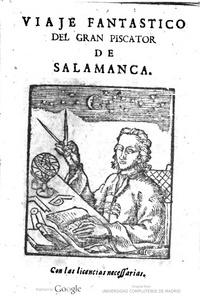Astrology and the novatores
Juan Gomez writes…
In one of my previous posts regarding early modern Spain I referred to Martin Martinez, a physician who was an avid promoter of the experimental method. Today I want to examine a debate he had regarding the rejection of astrology. In this blog we have provided many illustrations of the methodological statements typical of those who promoted and adopted experimental philosophy. We have shown the insistence in rejecting the work of those that rely solely on speculation, but we have not yet seen any examples of the work of speculative philosophers. The case of astrology in 1720s Spain can shed some light on the kind of speculative science rejected by experimental philosophers like Feijoo and Martinez.
Besides the comments he added supporting Feijoo’s work, Martinez wrote a whole essay (Juicio final de la astrologia (The final judgment of astrology)) rejecting astrology in 1727. He distinguished between astronomy and astrology: while in the former “the regular movement of the stars is observed…times are computed, lunar cycles determined, and eclipses are predicted”, in the latter astrologists “feign a volume (only intelligible to them) in the heavens where they find written mundane events, wars, famine, pests, shipwrecks, harvests, diseases, and all other fortunes of human life.”
In the comments he makes defending Feijoo’s work, Martinez clarifies that the problem with astrology is that it is not founded in observation and experience:
“Upon reflection, according to what reasoning, or experience, do the astrologists found their imagined influxes of the stars and planets? On what grounds do they know that Mars burns, and Saturn cools? They probably say, because Mars is red and Saturn grey: though according to this they should also say that carnations burn and quicklime cools; and if they say they experience heat coming from Mars, I do not understand how they know it comes from it, and not from another cause.”
Martinez goes on listing a number of claims astrologists make, in particular related to the effects the movement of the planets and stars, eclipses, and comets have on the health of individuals. But Martinez is directing his claims to one individual in particular, Diego de Torres Villaroel, a mathematician and astrologist who published yearly almanacs with predictions under the pseudonym “el gran Piscator de Salamanca”. Leaving the calendars aside, Torres also published an essay containing his ideas on the nature of the earth and the heavens. The text was first published in 1724 under the title Viaje fantastico del gran Piscator de Salamanca (The fantastic journey of the great Piscator of Salamanca), and then again in 1739 as Anatomia de todo lo visible e invisible (Anatomy of all that is visible and invisible). It is this book that Martinez targets, and will serve as our illustration of the kind of speculative philosophy the novatores rejected.
Torres’ essay gives an account of the structure and composition of the earth and the heavens, all this prompted by an eclipse which occurred on May 22, 1724. The explanation of the constitution of both spheres of the universe (heaven and earth) is given through a story where the great Piscator travels to the depths of the earth and then upwards to the heavens, illustrating to his fellow travellers all the details of both spheres. As is clear from various passages, Torres’ claims are never supported by observations, but only by the musings of his mind and astrological calculations. The opening lines of the dedicatory epistle highlight the speculative nature of the work:
“Hand over hand the soul, without resorting to the use of the external senses, and reason, in arms of a jobless idleness, let fantasy to its word, and running through the spaces of imagination it recited in their theatre the following story.”
Torres acknowledges that he writes from his imagination, but asserts that he reaches the same conclusions others (like Kepler, who studies “the cosmic machine”) have:
“With no other guide but my imagination, and sleeping like a log, I have completed the same journeys [as Kepler and Kircher].”
Although lines like the ones just quoted give the impression that Torres must be speaking metaphorically, it seems that his ‘discoveries’ had no other foundation that the inspiration he got from studying astrology. In the opening lines of the story, a character contrasts the method of astrologists like Torres to those who studied the eclipse by means of observation:
“How is it that you, Mr. Astrologist, in an eclipse whose nature and effects have excited the North and their less lazy Observers have been writing about, you do nothing other than note down in your Prediction the simple calculation of the time and the day?”
Torres defends himself, and convinces his companions to go on a journey through the earth and the heavens in order to understand the nature of eclipses and their effects on human events. In their journey through the earth the astrologist points out where hell and purgatory reside deep down where there is no influence of the heavenly bodies. Then they travel upwards to the heavens, where the astrologist explains the different levels, how all is made of ether, and its effects on the earth. He explains how when a comet is “of the nature of Saturn”, it “causes colds, leprosy, haemorrhoids, paralyses, and chronic diseases”; if it is dominated by Mars on the other hand, it causes “cruel dysentery, rotten fevers, delirium, haemorrhages…”
I could go on drawing on passages from Torres’ book, but the ones quoted above are enough to illustrate the opposition to astrology that the Spanish novatores insisted on. It is important to remember that figures like Feijoo and Martinez had a genuine worry regarding the influence of astrology. Unlike our present time, in the early decades of the eighteenth century astrology was still considered by many as a genuine science, and it was this (more than the almanacs) that motivated the novatores to call for a ban on astrology.


